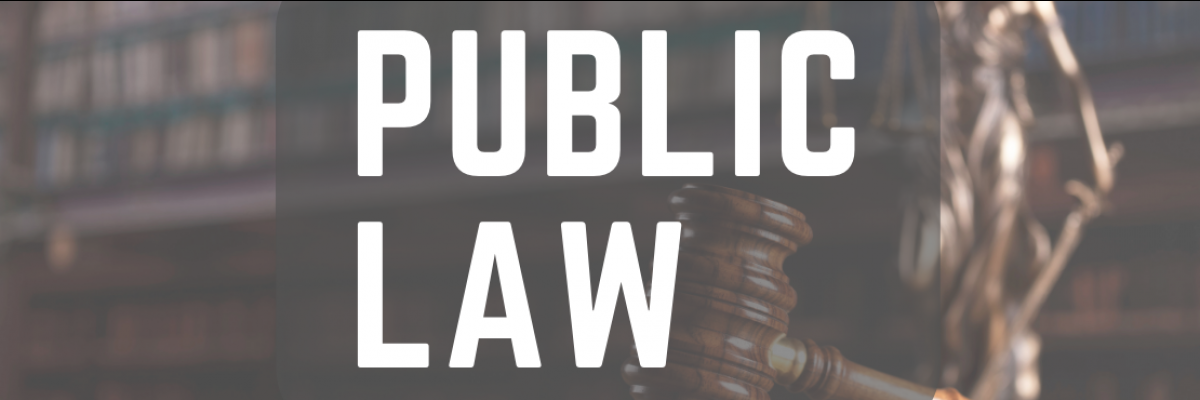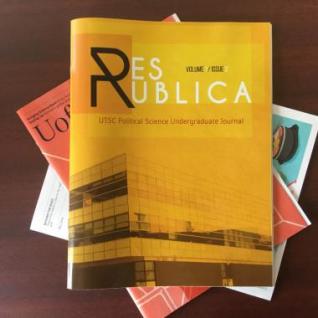Minor Program in Public Law Minor (HBA)
Admissions Category: Social Sciences & Humanities

Program Overview
The Minor in Public Law examines how the legal system, of which the constitutional order and judiciary are integral parts, governs the relationship both among constituent units of the state and between citizens and the state. It also examines the obligations that states have to one another via international law. Courses in the program address the normative foundations of principles of justice and human rights; the role of constitutions and courts in safeguarding the rule of law, protecting civil liberties, and curbing state power; the constraints to state sovereignty posed by international law and international courts; and the implications of the legal order for democratic and legitimate policy-making.
Complementary Programs:
Major or Minor Programs in Political Science, Public Policy, City Studies, Sociology, Economics for Management Studies, Psychology
Check out future career opportunities and skills acquired from completing this program:
Competencies & Skills
- An understanding of the law in its broader context
- The ability to analyze issues from a variety of perspectives
- Critically analyze problems, think creatively and make decisions while considering different sides of an argument
- Understand social issues and their relation to contemporary legal questions
Careers for Graduates
- Policy Analyst/Advisor in Government
- Research Analyst in Think Tanks
- Legislative Aide/Assistant in Government
- Service Representative in Social and Community Government (all levels of government)
- Lawyer
- Judge
- Labour Relations Specialist
- Law Clerk
- Legal Aid Worker
- Paralegal
- Policy Researcher
Further Education
- Political Science
- Policy (many varieties)
- Administration/Service
- Business Administration
- Law
- Paralegal
- Public Relations
- Community Service Management
Program Pathway
Year 1 | Year 2 | Year 3 | Year 4Choose Your Courses Wisely
- Explore different kinds of courses; this will also help with fulfilling breadth requirements and electives.
- Use Degree Explorer to plan your courses and program.
Develop Your Academic & Research Skills
- Learn how to read and write academic texts and do your own research; seek support from your professors and TA’s.
- Book an appointment with your program librarian for in-depth research assistance with your assignments; get writing support at the CTL Writing Centre.
Apply Theory to Practice
- Volunteer in DSL’s Alternative Reading Week to gain experience in community development and social change.
- Attend the University of Toronto Model Parliament (UTMP) conference to better understand the political processes.
- Start building your Co-Curricular Record (CCR) and search for Experiential Learning opportunities.
Become an Engaged Citizen (Locally & Globally)
- Get involved with the Law Society of UTSC (LSOU) and the Political Science Students’ Association (PSSA); also explore other relevant student clubs and activities on campus.
- Participate in Department of Student Life’s (DSL) LEAD program to build confidence, self-esteem and resiliency.
Plan for Your Future Career
- Volunteer with organizations to explore your interests; check listings on CLNx (>Jobs & Recruitment).
- Attend the UTSC Get Experience Fair in September and register with SCSU’s Volunteer Network Program to explore opportunities.
Year 2
Choose Your Courses Wisely
- 1.5 credits as follows: POLB30H3, POLB56H3 and POLB57H3.
- Use Degree Explorer to plan your courses and program.
- Meet with your Program Advisor or Supervisor to ensure you are on track with your degree.
Develop Your Academic & Research Skills
- Further develop your general academic skills by attending workshops offered by the Academic Advising & Career Centre (AA&CC) and Centre for Teaching & Learning (CTL).
Apply Theory to Practice
- Consider contributing in leadership about an issue that is important to you in the UTSC community by running for a seat on the Campus Council, Governing Council or the Academic Affairs Committee.
- Join the Law Society of UTSC (LSOU) and participate in a mooting or mock trial competition.
Become an Engaged Citizen (Locally & Globally)
- Check CLNx (>Jobs & Recruitment) to search for Work Study or volunteer positions on campus to gain experience and to get involved.
- Gain international experience by studying at an international host university for one term to one year through the Student Exchange Program; visit ISC for details.
Plan for Your Future Career
- Considering grad school? Speak to professors and advisors early so you are on track.
- Explore careers through the AA&CC’s Job Shadowing and In The Field programs.
Year 3
Choose Your Courses Wisely
- 0.5 credit as follows: POLC32H3
- 1.5 credit from: POLC33H3, POLC34H3, POLC36H3, POLC38H3, POLC39H3, POLC56H3, POLD30H3, POLD38H3, POLD42H3, POLD44H3, POLD45H3, POLD46H3.
- 0.5 credit from requirement above or an appropriate course from another discipline, including at UTSC, UTM and St. George, as approved by the Public Law Program Advisor.
Develop Your Academic & Research Skills
- Develop research skills by entering to win the UTSC Library Undergraduate Research Prize or Poster Forum.
- Conduct a 12-24 week research project at a university overseas through the Mitacs Globalink Research Award; or apply for the Summer Research Exchange Program to research at an international partner university; visit ISC for details.
Apply Theory to Practice
|
Become an Engaged Citizen (Locally & Globally)
- Join the Canadian Law and Society Association (CLSA); volunteer for their events and get to know people in your industry of interest.
- Intern with a Non-Governmental Organization in Ghana, Malawi, Sri Lanka or Tanzania with the Queen Elizabeth II Diamond Jubilee Scholarship Program; visit ISC for details.
Plan for Your Future Career
- Plan a career path with a staff member at the AA&CC.
- Check CLNx for networking events and employer information sessions to attend.
- Attend the Graduate & Professional School Fair in September.
- Talk to professors about how to strengthen your application for graduate school.
Year 4
Choose Your Courses Wisely
- Complete any remaining Public Law electives (POLC33H3, POLC34H3, POLC36H3, POLC38H3, POLC39H3, POLC56H3, POLD30H3, POLD38H3, POLD42H3, POLD44H3, POLD45H3, POLD46H3), if not yet completed in Year 3
- Ensure you have fulfilled your breadth requirements.
- Use Degree Explorer to ensure you are on track to graduate.
- Register your “Intent to Graduate” on ACORN by the deadline.
Develop Your Academic & Research Skills
- Apply for an Academic Travel Fund through DSL to research, present at a conference, or engage with the international academic community.
- Talk to professors from C- or D-level courses in which you did well to explore research assistantships.
- Develop your own research project by enrolling in POLD95H3.
Apply Theory to Practice
- Attend the Summer & Full-Time Job Fair in January to meet with potential employers looking to hire students for relevant summer and full-time positions.
Become an Engaged Citizen (Locally & Globally)
- Participate in the AA&CC’s Partners in Leadership program to learn and network with an alumni mentor about transitioning to work or further education.
- Volunteer to be a First Year Peer Advisor in DSL’s First Year Experience Program.
Plan for Your Future Career
- After you graduate, apply for the Ontario Legislature Internship Program to build a career in government, business, law, or academic life.
- Attend the AA&CC’s Get Hired job search conference in April/May, and attend a Jobs for Grads orientation for a job search “crash course.”
- Get your Personal Statement reviewed in the AA&CC.
